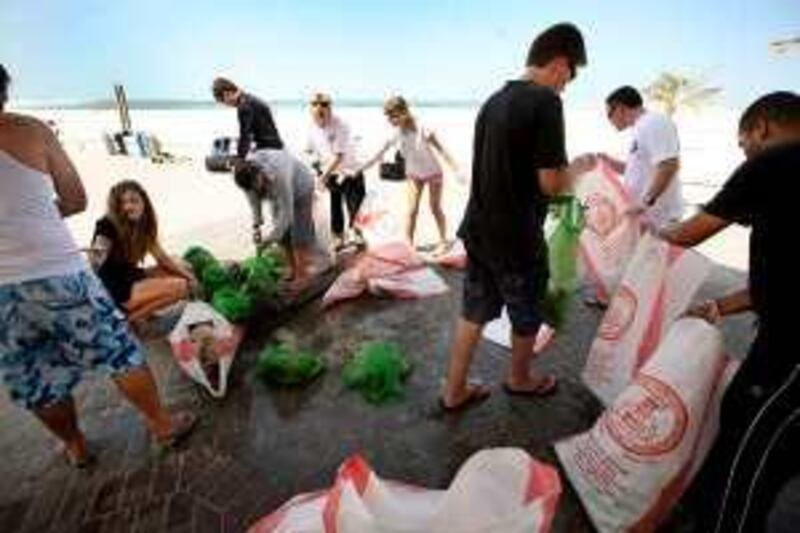DUBAI // Volunteers collected more than 200kg of rubbish yesterday from the sand and water of a small stretch of Dubai Open Beach. The 35 people worked for almost four hours on a 300-metre length of coast south of Port Rashid, some of them diving to a depth of eight metres to haul trash up from the sea floor. They cleared away piles of plastic bags, bottles and cigarette butts, underscoring growing concerns about pollution in the area.
The event was organised by Tawasul, an organisation that aims to teach diving and marine ecology to schoolchildren. The waste was collected, sorted and weighed and information about it will be sent to Project Aware, an American non-profit environmental group that collects and analyses data about pollution at a variety of beaches and dive sites. "Around 80 per cent of the waste was plastic, mostly bottles and bags," said Ernst Van Der Poll, the Dubai-based diving instructor who founded Tawasul. "This is worrying, as plastic is responsible for large numbers of deaths of marine animals."
While Dubai's beaches are regularly cleaned by municipal workers, the city does not have the means for underwater clean-ups. "We found a lot of plastic, as well as bottles and a sock," said Louis Osthuizen, 49, who dived for rubbish with his two sons, Okkie and Roelof. Cigarette ends were also everywhere, he said. "I saw a crab pulling one into its hole in the sand." The rubbish, he said, "shows a lot of disrespect for the environment".
Echoing the sentiment, another volunteer said that as he and a friend were picking up cigarette butts, "there were people smoking in front of us and throwing them away on the sand". The volunteers also collected large amounts of cans, glass bottles, food remains such as banana peels and chicken bones, nappies and discarded clothing. They also found an old battery, an item that rivals plastic as an environmental threat. Acids in batteries can leak into the soil, eventually reaching groundwater supplies.
Plastics can kill marine birds and mammals, and sea turtles, which are particularly vulnerable because they mistake plastic bags for jellyfish, which they eat, Mr Van Der Poll said. "And now is the season for jellyfish." In addition, there is research showing that plastic is entering the food chain. It is not eaten by bacteria but disintegrates over many years by ultraviolet light. What is left in the end are small granules, invisible to the naked eye. Marine invertebrates eat these particles, bringing them into the food chain.
"One way for people to help is to start using jute bags and refuse to take plastic bags from the supermarket," Mr Van Der Poll said. vtodorova@thenational.ae





